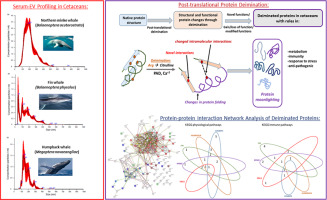当前位置:
X-MOL 学术
›
Comp. Biochem. Physiol. D Genom. Proteom.
›
论文详情
Our official English website, www.x-mol.net, welcomes your
feedback! (Note: you will need to create a separate account there.)
Deiminated proteins and extracellular vesicles - Novel serum biomarkers in whales and orca.
Comparative Biochemistry and Physiology D: Genomics & Proteomics ( IF 2.2 ) Pub Date : 2020-02-20 , DOI: 10.1016/j.cbd.2020.100676 Bergljót Magnadóttir 1 , Pinar Uysal-Onganer 2 , Igor Kraev 3 , Vilhjálmur Svansson 1 , Polly Hayes 4 , Sigrun Lange 4
Comparative Biochemistry and Physiology D: Genomics & Proteomics ( IF 2.2 ) Pub Date : 2020-02-20 , DOI: 10.1016/j.cbd.2020.100676 Bergljót Magnadóttir 1 , Pinar Uysal-Onganer 2 , Igor Kraev 3 , Vilhjálmur Svansson 1 , Polly Hayes 4 , Sigrun Lange 4
Affiliation

|
Peptidylarginine deiminases (PADs) are a family of phylogenetically conserved calcium-dependent enzymes which cause post-translational protein deimination. This can result in neoepitope generation, affect gene regulation and allow for protein moonlighting via functional and structural changes in target proteins. Extracellular vesicles (EVs) carry cargo proteins and genetic material and are released from cells as part of cellular communication. EVs are found in most body fluids where they can be useful biomarkers for assessment of health status. Here, serum-derived EVs were profiled, and post-translationally deiminated proteins and EV-related microRNAs are described in 5 ceataceans: minke whale, fin whale, humpback whale, Cuvier's beaked whale and orca. EV-serum profiles were assessed by transmission electron microscopy and nanoparticle tracking analysis. EV profiles varied between the 5 species and were identified to contain deiminated proteins and selected key inflammatory and metabolic microRNAs. A range of proteins, critical for immune responses and metabolism were identified to be deiminated in cetacean sera, with some shared KEGG pathways of deiminated proteins relating to immunity and physiology, while some KEGG pathways were species-specific. This is the first study to characterise and profile EVs and to report deiminated proteins and putative effects of protein-protein interaction networks via such post-translationald deimination in cetaceans, revealing key immune and metabolic factors to undergo this post-translational modification. Deiminated proteins and EVs profiles may possibly be developed as new biomarkers for assessing health status of sea mammals.
中文翻译:

脱蛋白和细胞外囊泡-鲸鱼和逆戟鲸中的新型血清生物标志物。
肽基精氨酸脱亚氨酶(PAD)是系统发育上保守的钙依赖性酶家族,可导致翻译后蛋白脱氨。这可能会导致新表位的产生,影响基因调控,并通过靶蛋白的功能和结构变化而使蛋白发挥月光作用。细胞外囊泡(EV)携带货物蛋白和遗传物质,并作为细胞通讯的一部分从细胞中释放出来。在大多数体液中都发现了电动汽车,它们可作为评估健康状况的有用生物标记。在此,对血清来源的EV进行了分析,并在5种甲壳动物中描述了翻译后修饰的蛋白质和与EV相关的microRNA:小须鲸,大须鲸,座头鲸,居维叶喙鲸和逆戟鲸。通过透射电子显微镜和纳米粒子跟踪分析评估EV血清分布。EV谱在5个物种之间变化,并且被鉴定为包含脱蛋白和选定的关键炎症和代谢microRNA。鉴定了一系列对免疫应答和代谢至关重要的蛋白质,这些蛋白质在鲸类血清中被终止,具有与免疫和生理相关的特定蛋白质的一些共享的KEGG途径,而某些KEGG途径是物种特异性的。这是首次鉴定和描述电动汽车并通过鲸类动物的这种翻译后修饰来报告脱皮的蛋白质和蛋白质-蛋白质相互作用网络的推定作用的第一项研究,揭示了经历这种翻译后修饰的关键免疫和代谢因子。
更新日期:2020-02-20
中文翻译:

脱蛋白和细胞外囊泡-鲸鱼和逆戟鲸中的新型血清生物标志物。
肽基精氨酸脱亚氨酶(PAD)是系统发育上保守的钙依赖性酶家族,可导致翻译后蛋白脱氨。这可能会导致新表位的产生,影响基因调控,并通过靶蛋白的功能和结构变化而使蛋白发挥月光作用。细胞外囊泡(EV)携带货物蛋白和遗传物质,并作为细胞通讯的一部分从细胞中释放出来。在大多数体液中都发现了电动汽车,它们可作为评估健康状况的有用生物标记。在此,对血清来源的EV进行了分析,并在5种甲壳动物中描述了翻译后修饰的蛋白质和与EV相关的microRNA:小须鲸,大须鲸,座头鲸,居维叶喙鲸和逆戟鲸。通过透射电子显微镜和纳米粒子跟踪分析评估EV血清分布。EV谱在5个物种之间变化,并且被鉴定为包含脱蛋白和选定的关键炎症和代谢microRNA。鉴定了一系列对免疫应答和代谢至关重要的蛋白质,这些蛋白质在鲸类血清中被终止,具有与免疫和生理相关的特定蛋白质的一些共享的KEGG途径,而某些KEGG途径是物种特异性的。这是首次鉴定和描述电动汽车并通过鲸类动物的这种翻译后修饰来报告脱皮的蛋白质和蛋白质-蛋白质相互作用网络的推定作用的第一项研究,揭示了经历这种翻译后修饰的关键免疫和代谢因子。









































 京公网安备 11010802027423号
京公网安备 11010802027423号